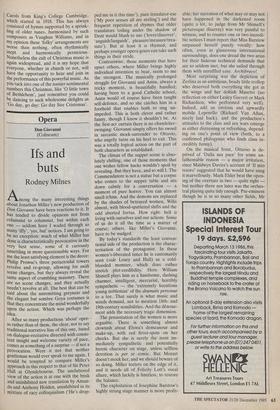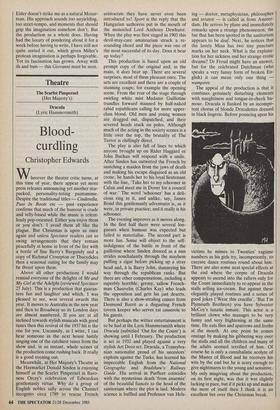Opera
Don Giovanni (Coliseum)
Ifs and buts
Rodney Milnes
Among the many interesting things .about Jonathan Miller's new production of Don Giovanni have been reactions to it. It has tended to divide opinions not from Columnist to columnist, but within each one — seldom have I waded through so many 'iffy', 'yes, but' notices. I am going to be no exception: much of what Miller has done is characteristically provocative in the very best sense, some of it curiously unsettling in more questionable ways. For me the least satisfying element is the decor: Philip Prowse's three periactoidal towers revolve and re-group, allowing for swift scene changes, but they always reveal the same aspect of crumbling masonry. There are no scene changes, and they actually needn't revolve at all. The best that can be said about the unremitting greyness and the elegant but sombre Goya costumes is that they concentrate the mind wonderfully upon the action. Which was perhaps the idea.
After so many productions 'about' oper- as rather than of them, the clear, not to say traditional narrative line of this one, based on dialogue-recitative directed with consis- tent insight and welcome variety of pace, comes as something of a surprise — if not a provocation. Were it not that neither gentleman would ever speak to me again, I would be tempted to compare Miller's approach in this respect to that of Sir Peter Hall at Glyndebourne. The uncluttered view of the action is at one with the brisk and uninhibited new translation by Aman- da and Anthony Holden, uninhibited in its mixture of racy colloquialism (`He's drop- ped me in it this time'), pure translator-ese (`My poor senses all are reeling') and the frequent repetition of rhymes that older translators toiling under the shadow of Dent would blush to use (`lover/discover', `anguishflanguish', pleasure/measure/trea- sure'). But at least it is rhymed, and perhaps younger opera-goers can take such things in their stride. Contrariwise, those moments that have upset others, where Miller brings highly individual invention to bear, seem to me the strongest. The musically prolonged struggle for Giovanni and Anna, always a tricky moment, is beautifully handled; having been to a good Catholic school, Anna would of course have been taught self-defence, and so she catches him in a foothold that enables both to sing un- impeded. This is both clever and rather funny, though I know it shouldn't be. At the first-act curtain there is no chandelier- swinging: Giovanni simply offers his sword in sarcastic mock-surrender to Ottavio, who angrily turns on his heel to exit. This was a totally logical action on the part of both characters as established.
The climax of the supper scene is abso- lutely chilling, one of those moments that one wishes fellow hacks wouldn't spoil by revealing. But they have, and so will I. The Commendatore is not a statue but a corpse who comes to the supper table and sits down calmly for a conversation — a moment of pure horror. You can almost smell it/him. And the demons are replaced by the shades of betrayed women, Wilis almost, with blood-spattered shifts and the odd aborted foetus. How right: hell is living with ourselves and our actions. Some of us do it all the time as a matter of course; others, like Miller's Giovanni, have to be nudged.
By today's standards the least conven- tional side of the production is the charac- terisation of the protagonist. In these women's-liberated times he is customarily seen (vide Losey and Hall) as a cold- blooded monster, which does rather stretch plot-credibility. Here William Shimell plays him as a handsome, dashing charmer, intelligent, mercurial, horribly sympathetic — the 'extremely licentious young nobleman' of the dramatis personae to a tee. That surely is what music and words demand, not to mention 18th- and 19th-century sensibilities. And the dénoue- ment adds the necessary tragic dimension.
The presentation of the women is more arguable. There is something almost clownish about Elvira's demeanour and make-up, with red fever-spots on her cheeks. But she is surely the most im- mediately sympathetic and potentially heroic character on stage, unless selfless devotion is per se comic. But Mozart doesn't mock her, and we should beware of so doing. Miller teeters on the edge of it, and it needs all of Felicity Lott's vocal allure, which luckily is limitless, to restore the balance.
The exploitation of Josephine Barstow's highly strung stage manner is more profit- able; her narration of what may or may not have happened in the darkened room (quite a lot, to judge from Mr Shimell's picturesque disarray) was very painful to witness, and to counter one or two incredi- ble notices I must report that Miss Barstow surpassed herself purely vocally: how often, even in glamorous international surroundings, does one dread the two arias for their hideous technical demands that are so seldom met, but she sailed through them with unruffled ease. Archibravo!
Most surprising was the depiction of Zerlina as an ambitious, beady little trollop who deserved both everything she got in the wings and her doltish Masetto (no reflection on either Lesley Garrett or Mark Richardson, who performed very well). Indeed, add an envious and upwardly mobile Leporello (Richard Van Allan, nicely laid back), and the production's attitudes to the class and sex wars emerge as either distressing or refreshing, depend- ing on one's point of view (both, to a confirmed philogynist who finds class in- credibly funny).
On the musical front, Ottavio is de- prived of Dalla sua pace' for some un- fathomable reason — a major irritation, since Maidwyn Davies's account of 11 mio tesoro' suggested that he would have sung it marvellously. Mark Elder beat the open- ing of the overture in two — quite right but neither there nor later was the orches- tral playing quite tidy enough. Pre-eminent though he is in so many other fields, Mr Elder doesn't strike me as a natural Mozar- tean. His approach sounds too unyielding, too strict-tempo, and moments that should grip the imagination somehow don't. But the production as a whole does. Having had the luxury of pondering about it for a week before having to write, I have still not quite sorted it out, which given Miller's protean imagination is perhaps forgivable. Yet its fascination has grown. Away with ifs and buts — this Giovanni must be seen.



















































































 Previous page
Previous page